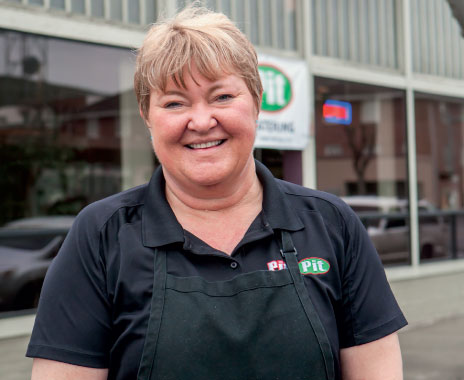Pam Leseman began her quick-serve career in 2004 with Subway after working in a country club and bartending. She managed three Subway units around Ephrata, Washington, bringing growth and stability for her, her team, and the franchisee.
When the owners looked to sell the stores and not keep any of the existing staff, Leseman knew she had to make a change. Although she had little exposure to Pita Pit, she longed to run her own business. In 2014, she opened her first unit. Soon after, she was honored as Pita Pit’s Rookie of the Year.
Leseman explains how managers can utilize their experience to become a franchisee, even when the transition is unexpected.
1. Be fast on your feet When it came to my attention that the Subway units were going to be sold, I wasn’t really sure what I was going to do. From a managerial stance, I never expected the business to abruptly stop. I would have had to start the process all over again, because the company buying the units was not keeping me or any of the staff.
In a two-week period before the stores closed, three of my customers approached me with the idea to open a Pita Pit in the area. Having only been to a location once, I was hesitant of the idea. But after multiple suggestions, I traveled to one about 70 miles away. Everything happened so fast: I remember walking into Pita Pit and falling in love with the brand, product, and general feel of the store. After my brief visit, I went to the company website, had a phone call the next day, and quickly took part in a “Discovery Day,” where corporate decides on prospective franchisees. I was approved shortly thereafter.
It was such a smooth transition, but it was a fast one. It was always a thought in the back of my mind that I might open up my own store, although I never forecasted it to pan out the way it did. But that’s the industry.
2. Embrace the challenge Living in a town without a big college, which is normally where Pita Pits pop up, I was somewhat apprehensive to present a foreign concept to the community. I knew it would be a challenge. The franchisor was always so supportive of my business, even though my location was not ideal. Having that support from day one has been a big part of my franchising success.
Most of my employees came with me when I decided to open up the Pita Pit, and I thankfully did not have to go through the difficulty of hiring a new team. With that sense of security from a staffing standpoint, we took on the community; I imagine almost 90 percent had never heard of the concept. It was an exciting time, and I would encourage managers looking to make the switch to choose a brand that supports them from day one and also excites them as business owners. It doesn’t necessarily have to be an unknown brand, but rather a brand that you feel you can succeed with. For me, I knew that was Pita Pit. Now I’m in the process of opening up another unit about 20 miles away from our first. It’s an exciting, challenging time.
3. Assume new responsibilities I had thought about running my own business over the years. It crossed my mind a lot, but then I would remember that I could pass certain responsibilities to the franchisee. It takes a lot of drive and initiative to become a franchisee. I still have people asking me if I ever go home. You have to be there. You have to physically be in the store on a daily basis. A lot of people might think that once you open the doors, the business is simply going to run itself; turn the sign on and the money will start flowing in. That’s simply not the case.
I don’t think the change from manager to franchisee is for everybody. There are many days where I’m here from open to close, and it definitely takes a certain personality to make a successful shift; it has to play to your strengths. The responsibilities change dramatically, too. Be ready to settle in to an onslaught of financial tests and trials, because you can no longer pass it to someone else. Everything is yours now, and you have to own it.
4. Count on community There’s no doubt in my mind that had I not built a strong relationship with the community, I would not have been as successful. I made it a point to involve myself in every way possible, from being a chamber member to being a Wish Granter with the Make a Wish Foundation. I also always feel the need to involve myself with any school-related fundraisers or activities. My community of customers was a support line for me starting this business and has led me to the continued success.
Whenever I worked for someone else, I always ran the business as if it were my own. I put everything into a managerial role and had confidence that I could transfer that into becoming a franchisee, but it was less scary with the community surrounding me. Even when I made the change, there was a professional community that was able to mentor me and coach me through the process. The support line I had from the franchisor, along with professional contact, allowed me to become a successful franchisee. Anybody looking to make this change needs to understand the importance of this relationship and fully utilize it to his or her benefit.







